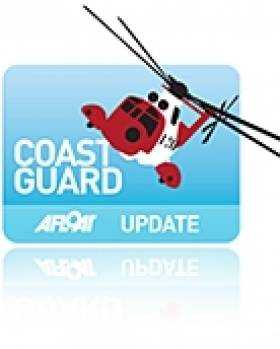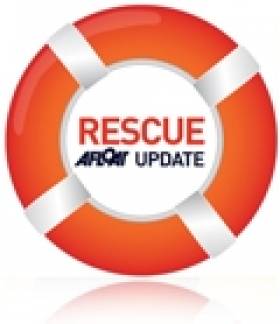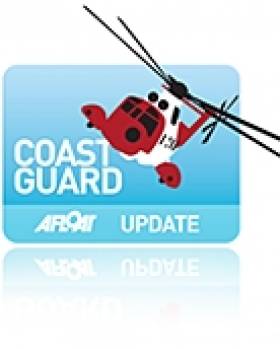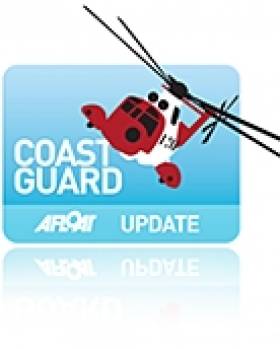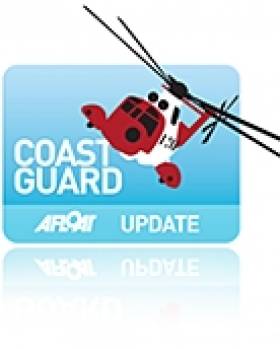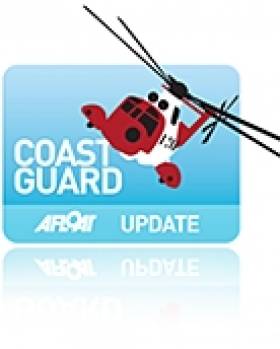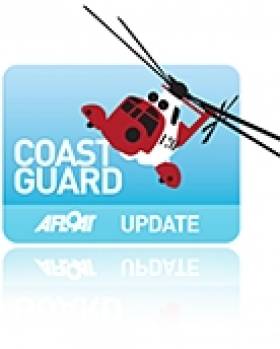Displaying items by tag: helicopter
Irish Coast Guard Chopper Deal Could Be Model for UK
The director of the Irish Coast Guard has outlined the thinking behind its recent €500m deal for helicopter search and rescue services.
Chris Reynolds told Rotorhub that a simplified model based on key critera was adopted when choosing a bigger for the contract, which was awarded to CHC Ireland last year.
"With our contract, we essentially wanted to continue with what we already had, but with new technology," he said.
Rotorhub reports that the Irish Coast Guard formed a Future Helicopter Study Group to discuss the service's needs before the tender process which led to the 10-year deal for five Sikorsky S-92s.
The process stands in contrast to SAR-H, the UK's programme to overhaul its helicopter fleet which collapsed last year.
"If the UK needs to be looking at a new interim contract, they could look at how we did it," added Reynolds.
Rotorhub has more on the story HERE.
Woman Rescued from Water at Howth Head
Irish Coast Guard helicopter Rescue 116 was on hand Wednesday to save a woman seen in the water close to cliffs near the Baily Lighthouse on Howth Head.
SAR Ireland reports that the helicopter was on a training exercise just up the coast in Malahide when passers-by raised the alarm with the Marine Rescue Coordination Centre (MRCC).
Rescue 116 sped to the scene and after a short low-level search the woman was spotted and taken to a waiting ambulance at the coastguard base for treatment.
The Irish Times says Howth gardaí are investigating the incident.
British Coastguard Fears Loss of Choppers
The union representing coastguard staff in the UK has expressed its fears over the loss of air rescue services when a number of helicopters are transferred to Ireland next year.
Under CHC's €500m contract to provide search and rescue services for the Irish Coast Guard, four helicopters will be withdrawn from England and Scotland for redeployment in Ireland.
However, HeraldScotland reports that the Maritime and Coastguard Agency (MCA) has no plans to replace these helicopters, which separately service Scotland's Isle of Lewis and Shetland Islands as well as the Solent and Portland in England.
The recent collapse of the privatisation deal for UK search and rescue services has meant there is no new operator lined up to replace CHC.
Jeremy Gautrey of the PCS union said that the situation "has now potentially left the coastguard service stranded without the guarantee that it will have sufficient helicopters to carry out search-and-rescue operations when the current helicopters retire."
HeraldScotland has more on the story HERE.
Speaking today, Minister for Transport Leo Varadkar TD said: This invitation to Achill Coast Guard Unit is an acknowledgement of the life-saving work that this Unit (and indeed all our Volunteer Units) around the country are engaged in every day of the year. Every day, these people selflessly risk their own lives to save others in all weathers, day and night, often in very dangerous conditions. This invitation is in recognition of their work and is an indication of the high esteem in which our Coast Guard Units are held internationally."
Achill Island Coast Guard Unit is made up of 24 volunteers who carry pagers and are available on 15 minutes' notice day and night 365 days a year. In August 2009 the Unit took part in a search and rescue operation for a person who fell into the Atlantic Ocean while fishing off the rocks near Achill Island. In response to this incident, the Achill Coast Guard rescue boat was launched together with local RNLI Ballyglass Unit and the Sligo Coast Guard helicopter during very hazardous weather conditions. The casualty (a Mr. Patrick Williamson) who amazingly stayed afloat swimming in high seas for over an hour was successfully rescued and spent 5 days in intensive care following his ordeal in the sea.
On making a full recovery, Mr. Williamson nominated Achill Island Coast Guard Unit for a National Courage Award. Previous recipients of this honour include the Irish Army (for peacekeeping duties) and former Taoiseach Mr. Bertie Ahern (for his involvement in the peace talks in Northern Ireland).
Director of the Irish Coast Guard, Mr. Chris Reynolds today said: "The Achill Coast Guard Unit is well-deserving of this honour and I congratulate them on being part of this special event. It is a great recognition of the standard and quality of service the Coast Guard provide and I thank Mr. Williamson along with all who helped make this happen for inviting them to take part in this special event."
Search and Rescue Services Firm Reports Loss
The Canadian company that provides search and rescue helicopter services for the Coast Guard has reported a €1.5 million operating loss in the 2009-2010 fiscal year, according to the Irish Independent.
CHC Ireland, the local division of the world's largest helicopter services company, operates search and rescue services out of Dublin, Shannon, Waterford and Sligo.
Directors of the firm, which employs more than 100 nationwide, noted that the loss - coming after a €3.2 million loss in the previous financial year - was reduced due to the closure of its Cork base and lower aircraft leasing costs.
Last year the Government awarded CHC a new 10-year contract worth €500 million to operate search and rescue services, despite proposals from the Air Corps that it could provide the same service at a much lower rate.
The Irish Independent reported recently that one of the world's top helicopter makers has denied claims made by the Coast Guard that the Air Corps does not have the equipment to undertake search and rescue operations.
AgustaWestland, which supplies the main helicopter used by the Air Corps, disputed allegations by Coast Guard director Chris Reynolds that the AW139 had not earned a "good reputation" elsewhere.
Fishermen Rescued From Sinking Vessel off Ardglass
Belfast Coastguard received a Mayday call at 5:54pm from the Newry registered vessel, which operates out of Ardglass, and immediately sent the Southdown and Portaferry Coastguard Rescue Teams to the scene. The launch was requested of the RNLI Portaferry inshore lifeboat. The Irish Coastguard Rescue Helicopter was tasked but was later stood down.
Steve Carson, Watch Manager, Belfast Maritime Rescue Coordination Centre, said:
"The crew aboard the fishing vessel were rescued by the inshore lifeboat and then taken to Ardglass Harbour where they received medical attention; one of the crew has since been taken to Downpatrick Hospital.
It is imperative to always ensure you are carrying the correct safety equipment and have it serviced regularly. Due to the prompt and appropriate action of the crew I am pleased to say they are all safe but shaken by their traumatic experience.
The rescue was successfully coordinated by Belfast Coastguard with assistance from their colleagues at Dublin, Liverpool and Holyhead Coastguard Stations.
The vessel has now been successfully refloated and is now alongside in Ardglass Harbour."
Stornoway Helicopter Reports Busiest Year Ever
Scottish Coastguard rescue helicopter based in Stornoway has recorded its busiest ever year after clocking up in excess of 200 callouts in 2010.
It is the first time the rescue helicopter team has reached the milestone figure for missions in any one year, traditionally responding to an average of 136 callouts between January 1 and December 31. Since the introduction of the new technology S92 helicopters in 2007 however this has risen to an average of 190.
Leading search and rescue (SAR) service provider CHC Helicopter has operated the service for the Maritime and Coastguard Agency in the UK since 2007 from four bases at Stornoway, Sumburgh, Lee on Solent and Portland. Through its membership of the Soteria consortium, it has been identified as the preferred bidder on the UK SAR-H program, a 25-year contract to provide helicopter-based SAR services from 12 bases throughout the UK.
Ian McLuskie, UK SAR Business Unit Leader at CHC said: "The past three years have been the busiest we've ever had in terms of callouts and this is due to the capability of the S92 aircraft which are able to fly faster and further than those previously in use.
"This increased operating range and speed allows us to get to locations quicker, the overall result is a reduction in the time taken to rescue and get medical aid to those in need. This has allowed the unit to be called out to a greater number of jobs throughout the year, bringing the search and rescue service to a greater number of people and helping to save many more lives."
The Stornoway unit conducted its 200th mission on December 10th when rescue helicopter R100 was scrambled to evacuate a 57-year-old female who required urgent hospital treatment after experiencing breathing difficulties. The patient was transferred to Raigmore Hospital in Inverness.
Today the Minister for Transport Mr Noel Dempsey T.D. announced the 2011 Estimates provision for his Department. The following are the principal features of the 2011 Estimates for marine affairs in his remit.
The 2011 capital provision will be €15 million, compared with €13 million in 2010. The principal item of capital expenditure is the provision of a search and rescue helicopter service (€8 million). Also included is expenditure on the Irish Coast Guard, maritime safety and remedial works at regional harbours.
The 2011 provision will be €39 million unchanged from 2010 for current expenditure. The principal item of expenditure is the provision of a search and rescue helicopter service (€27m current expenditure).
Coast Guard Winchman Retires after 30 Years' Service
Noel Donnelly (55), who is retiring after more than 30 years' service, worked as winchman and paramedic. He completed his last shift at the Sligo Coast Guard search and rescue base last week and retires officially this month.
Originally from Tyrone, Mr Donnelly began his career with the Air Corps, flying in Alouette and Puma helicopters. He left in 1984 to take a job as a diver with a civil engineering firm in Aberdeen, Scotland, and subsequently worked as an ambulance driver in Co Kildare. For more about this article please click here
Fire on Board Stena Ferry
Two lifeboats proceeded to the Stena Pioneer this afternoon after crew on the ferry issued a mayday call reporting a fire in their engine room whilst they were on passage to Fleetwood on the Irish Sea. A helicopter was also placed on standby.
Liverpool Coastguard received the mayday at 3.36 pm and made contact with crew on board the vessel, who reported that they still had full power and steering but that there was a fire in the engine room that they were fighting with their on board fire fighting equipment.
Liverpool Coastguard sent lifeboats from Fleetwood and Barrow to the scene. The fire was reported as out at 4.30 pm and the ferry is now docked at Fleetwood.
Liverpool Coastguard Watch Manager Paul Parkes said:
"A fire on a ferry 12 miles out with 46 people on board could potentially turn into a very serious incident, and so we acted quickly to send rescue resources to its aid. Luckily, the fire was dealt with using on board equipment and so the lifeboats escorted the ferry into Fleetwood where it was met by Lancashire Fire and Rescue service and an MCA surveyor."


























